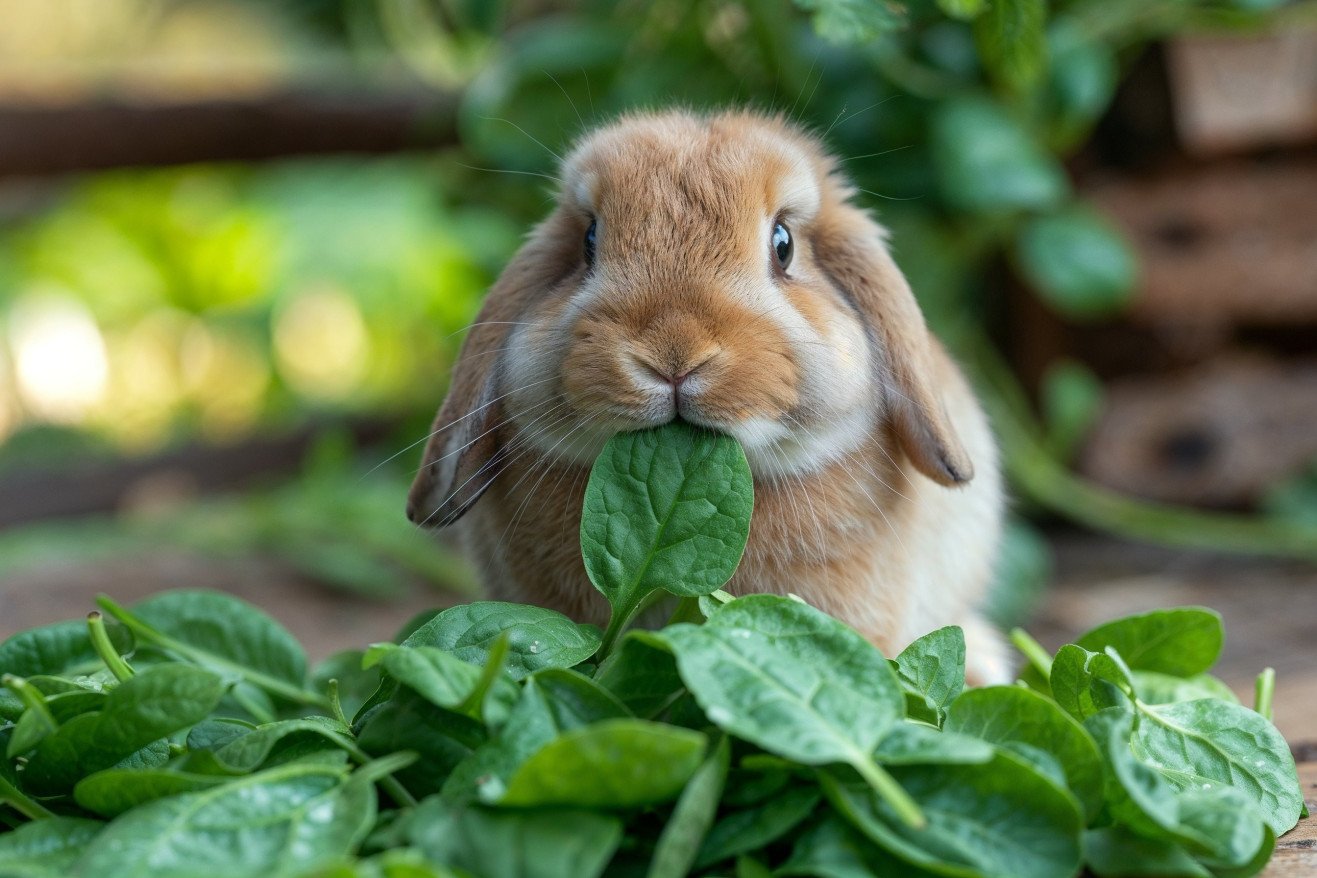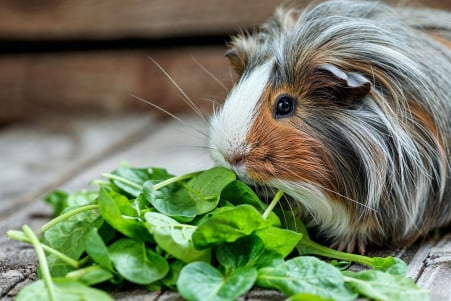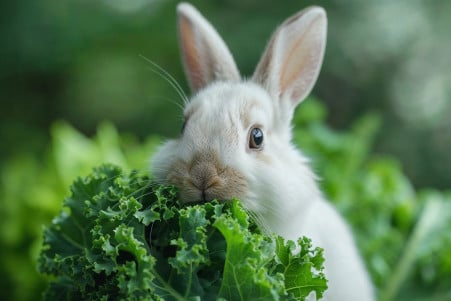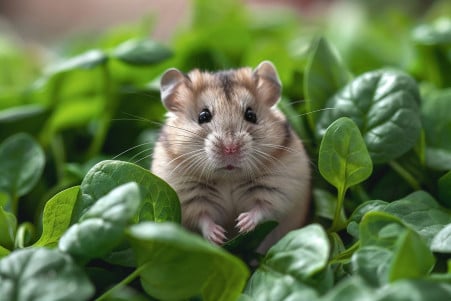Can Rabbits Eat Spinach? Guidelines for a Healthy Rabbit Diet
26 January 2024 • Updated 28 January 2024

While spinach is considered a superfood for people, can it be a part of a healthy diet for your rabbit? Yes, rabbits can eat spinach in moderation because it has some nutritional benefits. However, spinach is also high in oxalates, which can affect urinary health, so it should be fed no more than twice a week and in small amounts, as part of a well-rounded diet that includes hay and other vegetables.
This article will cover the pros and cons of feeding spinach to rabbits, and it will be based on evidence from a variety of studies and nutritional data. This will include a thorough examination of research in veterinary nutrition, comparative dietetics, and rabbit physiology to help determine the best way to feed rabbits for optimal health. By the end of this article, you will know exactly how to feed your rabbit spinach safely.
Can rabbits eat spinach?
Spinach in a Rabbit’s Diet: A Nutritional Analysis
While spinach is a nutritional powerhouse for people, it has some positive and negative implications for rabbits. A single serving of spinach is packed with vitamins and minerals, including vitamin K, which is important for blood clotting, and vitamin A, which is important for vision, according to Verywell Health.
Spinach is also a good source of vitamin C, which is an important antioxidant, and iron, which is important for blood health. In addition, the fiber in spinach is important for a rabbit’s digestive health.
On the other hand, the high oxalate content in spinach is a potential downside. As LiveStrong explains, oxalates can combine with calcium to form crystals that can lead to kidney stones. While oxalates are a naturally occurring plant chemical, they can cause problems if they are consumed in high amounts, including urinary tract issues.
To make sure that rabbits get the benefits of spinach while minimizing the risks, it’s important for rabbit owners to feed spinach in moderation. Spinach is both more nutrient-dense and higher in oxalates than many other vegetables that are commonly fed to rabbits. As a result, it’s important to make sure that rabbits get a variety of greens and to balance spinach with other greens that are lower in oxalates.
Oxalates in Spinach and Their Impact on Rabbits
Oxalates, which are found in a number of plants, including spinach, are organic compounds that can bind to minerals like calcium and magnesium, reducing the amount of these minerals that are available to rabbits.
This can lead to the formation of calcium oxalate crystals, which can lead to urinary tract problems, including bladder stones, according to rabbits.life. If these crystals build up, they can lead to a condition called “bladder sludge,” which can be painful and dangerous for rabbits, according to Proceedings from dvm360.
Rabbits that are having health problems related to oxalates may show signs like changes in how often they urinate, blood in their urine, or signs of pain when they urinate.
To reduce the risk of these problems, experts recommend feeding rabbits spinach in moderation—no more than once or twice a week—and making sure it’s fresh and has been washed thoroughly to remove any contaminants. Rabbits.life also recommends a mix of leafy greens in a rabbit’s diet and suggests that high-oxalate foods like spinach should be limited to one type of food per meal.
For rabbits that are particularly sensitive to oxalates, owners may want to consider other low-oxalate vegetables, such as kale, which research from the U.S. Department of Agriculture shows has much lower levels of oxalic acid than spinach. By offering a variety of greens, you can help ensure your rabbit’s diet is balanced while reducing the risk of oxalate-related problems.
How to Add Spinach to Your Rabbit’s Diet
If you want to add spinach to your rabbit’s diet, it’s important to do so gradually. The RSPCA recommends portioning spinach based on the size of your rabbit. For example, a small rabbit may only be able to eat a few leaves, while a larger rabbit may be able to eat a small handful.
Start with a small amount and see how your rabbit reacts. If you notice any signs of digestive upset, like diarrhea, after your rabbit eats spinach, discontinue feeding it to them.
The House Rabbit Society recommends feeding spinach no more than twice a week and feeding it fresh, not wilted or cooked, to avoid digestive problems. Squeaks and Nibbles also recommend washing spinach leaves thoroughly to remove pesticides and cutting off the roots to avoid giving your rabbit too much sugar.
Once you know your rabbit can tolerate spinach, you can feed it to them in moderation. Just make sure to continue to prioritize hay in your rabbit’s diet, using spinach and other vegetables as a supplement. This will help ensure that your rabbit gets the benefits of spinach without overdoing it and will help you figure out which other vegetables you can add to your rabbit’s diet.
Expanding the Vegetable Palette for Bunnies Who Love Their Greens
Make sure your rabbit is getting a well-rounded diet that goes beyond the occasional piece of lettuce. Different vegetables will help ensure that your rabbit is getting a well-rounded diet, with a range of vitamins, minerals, and fiber.
Oxbow Animal Health lists some of the best vegetables for rabbits as kale, watercress, bell peppers, and squash. Not only do these vegetables meet a rabbit’s nutritional needs, but they are also low in oxalates, which can be harmful to rabbits.
The House Rabbit Society explains that a variety of vegetables will not only provide a variety of nutrients but also a variety of textures and tastes that can help with dental health and prevent boredom. Keep your rabbit engaged and healthy by rotating safe vegetables, adding a new one while phasing out another.
A rabbit’s diet should be made up mostly of high-quality grass hay, with a smaller portion of fresh vegetables. A general rule of thumb from Rabbit.org is one cup of mixed greens for every two pounds of rabbit body weight per day, which will ensure that the rabbit gets a variety of flavors and nutrients.
Make sure to introduce a variety of vegetables to ensure that their nutritional needs are met and to keep their diet interesting.
Final Thoughts on Feeding Spinach to Rabbits
So, while spinach can be a healthy part of a rabbit’s diet, it should be used with care. The nutrients in the leaves can be helpful, but the oxalates mean that it should be fed in moderation to avoid potential health problems like urinary tract issues. This makes the ideas of moderation and variety more than just helpful but necessary to keep your rabbit healthy.
The recommendations also stress the importance of introducing spinach slowly, watching for your rabbit’s response, and making sure to stick to the recommended serving sizes. Responsible feeding, which includes offering a variety of vegetables and changing them up regularly, will help ensure that your rabbit has a well-rounded diet and stays healthy.
As rabbit parents, our ultimate goal is to make sure that we’re feeding our pets in a way that will help them live long, healthy lives. By following the safe feeding guidelines, you can make sure that spinach is a helpful, if occasional, part of your rabbit’s varied and healthy diet.


